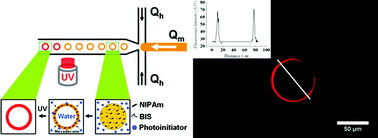We present a simple one-pot synthetic approach for the preparation of monodisperse thermo-sensitive poly(N-isopropylacrylamide) (PNIPAM) microcapsules in a microfluidic system. Based on the mechanism of shear force-driven break-off, aqueous droplets of monomer solution are continuously generated in an immiscible continuous phase containing photoinitiators. Under UV irradiation, activated initiators are diffused into the interface between the continuous phase and the aqueous droplets, which trigger polymerization of NIPAM monomers. The PNIPAM microcapsules produced are hollow microcapsules with a thin shell membrane, high monodispersity, and fast response to environmental temperature. In addition, the size of microcapsules produced can be manipulated by the flow rate of the continuous phase or aqueous phase and different concentrations of surfactant to control interfacial tension between continuous phase and aqueous phase. Furthermore, the versatility of this approach enables the preparation of monodisperse microcapsules having the capability to encapsulate various materials such as proteins and nanoparticles under mild conditions. The in situ microfluidic synthetic method provides a novel approach for the preparation of monodisperse hollow microcapsules via a one-pot route.

You have access to this article
 Please wait while we load your content...
Something went wrong. Try again?
Please wait while we load your content...
Something went wrong. Try again?


 Please wait while we load your content...
Please wait while we load your content...